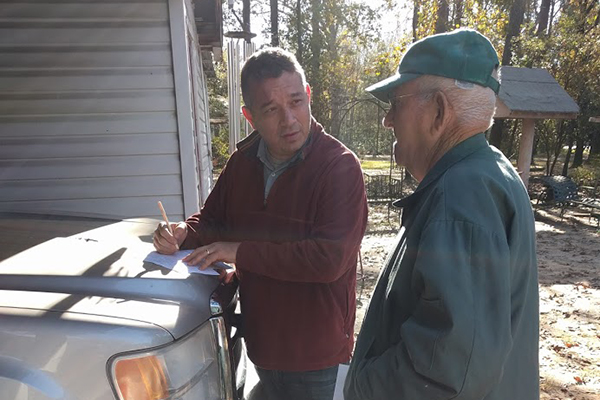Virginia Tech on National Science Foundation RAPID grant to study well contamination in aftermath of Hurricane Florence
November 26, 2018
Andrew George meets one-on-one with community members to collect well water samples.
A team of scientists from the UNC Institute for the Environment’s Environmental Resource Program (ERP) and Virginia Tech has been awarded a National Science Foundation RAPID grant to quickly mobilize a study of private well contamination in New Hanover and Robeson counties in North Carolina.
Nearly one-third of residents in the state rely on private wells for drinking water. Private wells are unregulated, leaving individual well owners responsible for ensuring the safety of their drinking water. After record flooding from Hurricane Florence, many of these wells were susceptible to contamination from things like harmful bacteria and hazardous waste to toxic metals.
“Universities are well positioned to bring both scientific and human resources into communities dealing with natural disasters,” says Kathleen Gray, a co-principal investigator on the grant and director of the Environmental Resource Program. “In this case, Virginia Tech was a leader in water quality testing, and UNC-IE provided the vital connection to people on the ground who were concerned about the safety of their drinking water.”
The research team is focusing efforts on New Hanover and Robeson counties due to their proximity to industrial sites, including coal ash and hazardous waste impoundments, concentrated animal feeding operations (CAFOs) and other naturally occurring metals.
“We submitted the proposal even before Florence hit, before we had any indication of how intensive the flooding would be,” says Andrew George, a community engagement coordinator for ERP. “These funds enable us to be responsive to the community in a careful, thoughtful way and in a more timely fashion. When you are dealing with something like drinking water, it’s really what the community needs.”
Over the duration of the study, the team will test 250 wells to determine if the water is contaminated and to look for the source of the contamination. Three months after the initial test, the team will reconnect with participants to retest the water and evaluate changes, which is critical for determining remediation strategies.
As a temporary remediation step, the research team will distribute ZeroWater pitchers to every participant in the study. ZeroWater filters are one of the only filters that have been proven to remove contaminants including arsenic and lead. The pitchers were provided by ZeroWater for free or at a deep discount.
This study is unique, George says, because they have incorporated a community engagement and citizen science component.
“In a traditional study, the researchers collect data, but the community may never hear from the scientists again. We are going into the community, training residents to collect samples, hand-delivering the results to folks and answering their questions.”
Over the last several years, ERP has been supporting community networks in North Carolina that are mobilizing around concern about water contamination from coal ash impoundments . The team has used this network to coordinate with local leaders to identify households for water sampling. They have spent a great deal of time getting to know the community through door-to-door interactions and town hall style meetings where they have collaborative, bidirectional discussions, giving the community a voice and an opportunity for the researchers to be responsive to their concerns.
“If we can help provide a better understanding of the science that underpins concerns that they have, that is going to go a long way in helping these communities that have been dealing with disproportionate burdens of pollution,” George says.
Another component of the study is a survey that will collect data from well-users that can be used to improve resilience in future natural disasters and flooding.
For more information, contact:
Andrew George
andrewg@unc.edu
(919) 966-7839
